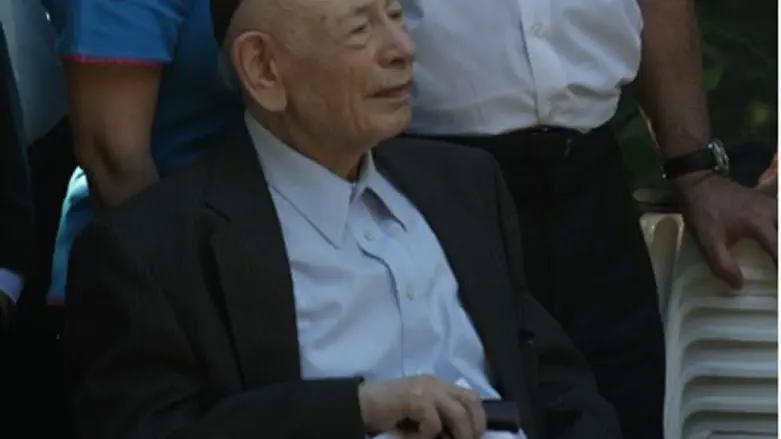
Arutz Sheva spoke on Thursday with director Moshe Levinson who, for two years, worked on the film “Ben Zion” about Professor Benzion Netanyahu, father of Prime Minister Binyamin Netanyahu, who died this week at the age of 102.
Levinson, who worked closely with Netanyahu, said that he regretted that the subject of the film did not live to see it.
“I am very said that he did not get to see the finished film,” he said. “In the film one can get a feel for his unique personality. Professor Netanyahu was a charming, cultured, educated man who was very pleasant to talk to. He had a sense of humor. He was a figure that the public did not know very well and in this respect, I'm glad the film was made.”
Levinson said that, in addition to highlighting Netanyahu’s personality, the film also sheds a light on important periods in the history of Zionism.
“Since the late 1920s, Prof. Netanyahu was a political activist,” he said. “He was a member of the Revisionist movement and he contributed greatly, through his intellectual capabilities, to the movement and to the State of Israel. Starting in the 1940s he served as the head of the delegation of the Revisionist Party and became director of the party in the U.S. after Jabotinsky's death.”
Levinson noted that Benzion Netanyahu liked to have an influence but always preferred to do it in a quiet manner. “He never chased the media, the media chased him. All he cared about was doing research. He was the one who recommended to Jabotinsky in the late 1940s to move the Revisionist Party from the UK to the U.S.”
He said the decision to make a film about Netanyahu came about by accident. “I met him two years ago at an event. I saw before me a man sitting upright. I knew a few things about him and was amazed that no one had ever done a movie about him. I came to his home and we sat and talked for about three hours. He gave his consent to produce the film. I'm sure he did not do this to get personal satisfaction, but because he felt that he wanted to get a few messages out.”
Levinson said that during the production of the film, he found a man who, despite his advanced age, was acting young and energetic.
“Although he was over the age of 100, he spoke like a 60-year-old and was clear and sharp,” said Levinson. “He read without glasses and all his medical examinations were excellent. So from this point, his death was a surprise for me. Last time I saw him was several months ago.”
The film also features interviews with Prof. Benzion Netanyahu’s sons, Prime Minister Binyamin Netanyahu and Dr. Ido Netanyahu. Levinson noted that the film exposes the phenomenon of the exclusion of revisionists from the Israeli establishment, including Netanyahu who had been excluded by the Israeli academia.
“The importance of the film is that it not only shows great episodes in the history of Zionism, but also sheds light and explores the exclusion of the Revisionists,” he said. “When Prof. Netanyahu returned to Israel from the United States in 1949, he was well-known, and yet the Hebrew University never invited him to speak. That didn’t stop him from helping to establish the most important enterprise of the State of Israel, Encyclopaedia Hebraica.”
Prof. Netanyahu was chief editor of the Encyclopaedia Hebraica for ten years and served as professor of Hebrew language and literature and professor of medieval Jewish history and Hebrew literature in several universities in the U.S. He was professor emeritus at Columbia University.
Earlier this week Yossi Achimeir, Director of the Jabotinsky Center, said that Netanyahu should have been awarded the Israel Prize for his important research, which included a monumental research work about the Inquisition, called “The Origins of the Inquisition in Fifteenth Century Spain.” The research was translated into various languages and distributed in several editions around the world.
“If anyone deserved the Israel Prize it was Benzion Netanyahu,” said Achimeir, adding that he believes this was because Netanyahu “bothered some of the inhabitants of the academic ivory tower, partly because of his right wing political views and his adherence to Jabotinsky's teachings, the doctrine of political Zionism.”
